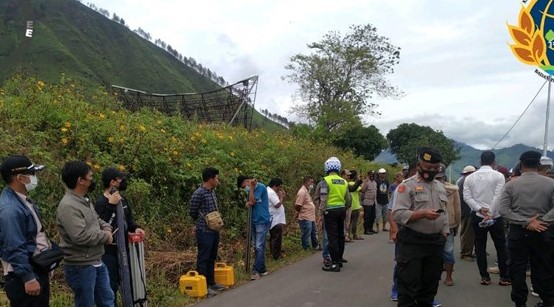Agrarian Conflict Handling Policy in the Tourism Village Development Program in the Lake Toba Area
DOI:
https://doi.org/10.31292/mj.v3i2.51Keywords:
Agrarian conflict, local government, case settlement, disagreementAbstract
Lack of public knowledge about land ownership and the inability of the public to control emotions in solving problems can trigger conflicts, both conflicts of interest and agrarian conflicts. Furthermore, local government policies that are not firm enough in dealing with people who do not fully understand land ownership and assets that cannot be controlled by individuals are also factors in agrarian conflicts. Agrarian conflicts in each region are different, but it is possible that the causal factors and chronology are the same as in other regions. This paper aims to discuss local government policies in handling agrarian conflict cases. Interviews were the method used. We use interview techniques to explore the chronology of conflict cases and their resolution. The study employs qualitative data analysis techniques. The study's results demonstrate that related parties engage in deliberation to implement the policy for handling agrarian conflicts. The land office's role in conflict resolution is to provide land administration services. Once the Ombudsman of the Republic of Indonesia receives a case report, they must proceed through several stages before issuing a decision letter. Only the Regency Government and the Land Office must cooperate by adhering to the stages and participating in the Ombudsman's examination.
Downloads
References
Adiansah, W., Nulhaqim, S. A., & Basyar, G. G. K. (2021). Resolusi Konflik Berbasis Komunitas Melalui Pengembangan Masyarakat Sebagai Upaya Alternatif Resolusi Konflik Agraria. Share?: Social Work Journal, 10(2). https://doi.org/10.24198/share.v10i2.31200
Batlajery, A., Pattiselanno, A. E., & Kakisina, L. O. (2018). Konflik Agraria Di Desa Watmuri Kecamatan Nirunmas Kabupaten Maluku Tenggara Barat. Agrilan?: Jurnal Agribisnis Kepulauan, 5(2). https://doi.org/10.30598/agrilan.v5i2.157
Braun, V., Clarke, V., Boulton, E., Davey, L., & McEvoy, C. (2021). The online survey as a qualitative research tool. International Journal of Social Research Methodology, 24(6). https://doi.org/10.1080/13645579.2020.1805550
Creswell, J. W. (2016). Research Design: Pendekatan Metode Kuantitatif, Kualitatif, dan Campuran (A. F. & R. K. P. (Penerjemah), Ed.; Keempat). Pustaka Pelajar.
Deca, D., & Pitriani, H. (2024). Manajemen Konflik dalam Sebuah Organisasi. Cendekia Inovatif Dan Berbudaya, 1(3). https://doi.org/10.59996/cendib.v1i3.355
Ginting, R. (2020). Analisis Sektor Basis Dan Kontribusi Sektor Pertanian Terhadap Produk Domestik Regional Bruto Di Kabupaten Dairi. Quantitative Economics Journal, 4(2). https://doi.org/10.24114/qej.v4i2.17466
Harahap, Y. R., Damanik, I. H., & Sibarani, R. (2019). Kearifan Lokal Masyarakat Adat Batak Parlilitan Dalam Pelestarikan Sumber Daya Agraria (Tanah Ulayat). Jurnal Antropologi Sumatera, 17(2).
Ihsan, A., & Salim, M. N. (2022). Ulayat Land and Agrarian Reform Policy in West Sumatra. Marcapada: Jurnal Kebijakan Pertanahan, 1(2), 155–171. https://doi.org/10.31292/mj.v1i2.17
Jayus, J. A. (2019). Eksistensi Pewarisan Hukum Adat Batak. Jurnal Yudisial, 12(2). https://doi.org/10.29123/jy.v12i2.384
Junarto, R. (2022). Agrarian reform: the reflection on the performance of the agrarian reform task force (GTRA) in the special region of Yogyakarta. Inovasi, 19(2), 133–145. https://doi.org/https://doi.org/10.33626/inovasi.v19i2.492
Junarto, R., & Salim, M. N. (2022). Strategi Membangun Kemandirian dan Kesejahteraan Masyarakat Desa: Bukti Dari Gunung Sewu Geopark, Indonesia. Tunas Agraria, 5(2), 142–164. https://doi.org/https://doi.org/10.31292/jta.v5i2.181
Kadarsih, S. (2010). Tugas Dan Wewenang Ombudsman Republik Indonesia Dalam Pelayanan Publik Menurut Uu No. 37 Tahun 2008. Jurnal Dinamika Hukum, 10(2), 175–182. https://doi.org/10.20884/1.jdh.2010.10.2.150
Nisa, A. H., Hasna, H., & Yarni, L. (2023). Persepsi. Jurnal Multidisiplin Ilmu, 2(4).
Primayanti, D., & Fedryansyah, M. (2019). Konflik Agraria Antara Aliansi Gerakan Reforma Agraria (AGRA) Pangalengan Dengan Perusahaan Daerah Agribisnis Dan Pertambangan (PDAP). Jurnal Kolaborasi Resolusi Konflik, 1(1). https://doi.org/10.24198/jkrk.v1i1.20891
Sibarani, K. R. (2021). Pendaftaran Tanah Ulayat yang menjadi Hak Milik Perseorangan Pada Suku Batak Toba di Pulau Samosir, Sumatera Utara. Jurnal Kajian Konstitusi, 1(2). https://doi.org/10.19184/jkk.v1i2.27770
Sihombing, M. M. R. (2020). Sistem Kekerabatan Suku Batak Toba. Jurnal Sains Dan Teknologi ISTP, 13(1).
Suleman, S. (2018). Kinerja Ombudsman Perwakilan Maluku Utara dalam Mewujudkan Pelayanan Publik yang Prima Di Kota Ternate. Aristo, 6(2), 262. https://doi.org/10.24269/ars.v6i2.1023
Suparyanto dan Rosad (2015. (2020). ??No Title No Title No Title. Suparyanto Dan Rosad (2015, 5(3), 248–253.
Tomaszewski, L. E., Zarestky, J., & Gonzalez, E. (2020). Planning Qualitative Research: Design and Decision Making for New Researchers. International Journal of Qualitative Methods, 19, 1–7. https://doi.org/https://doi.org/10.1177/1609406920967174
Wulan, D. R., Salim, M. N., & Rineksi, T. W. (2022). Re-Scanning the Electronic Certificate Infrastructure (Sertipikat-el). Marcapada, 2(1), 12–23. https://doi.org/https://doi.org/10.31292/mj.v2i1.24
Yin, R. K. (2015). Qualitative Research From start to finish. In The Guiford Press (2nd edition, Issues 7–8). The Guilford Press.

Downloads
Published
How to Cite
Issue
Section
License
Copyright (c) 2024 Lutfia Dwi Rosiani, Amru

This work is licensed under a Creative Commons Attribution-ShareAlike 4.0 International License.

















